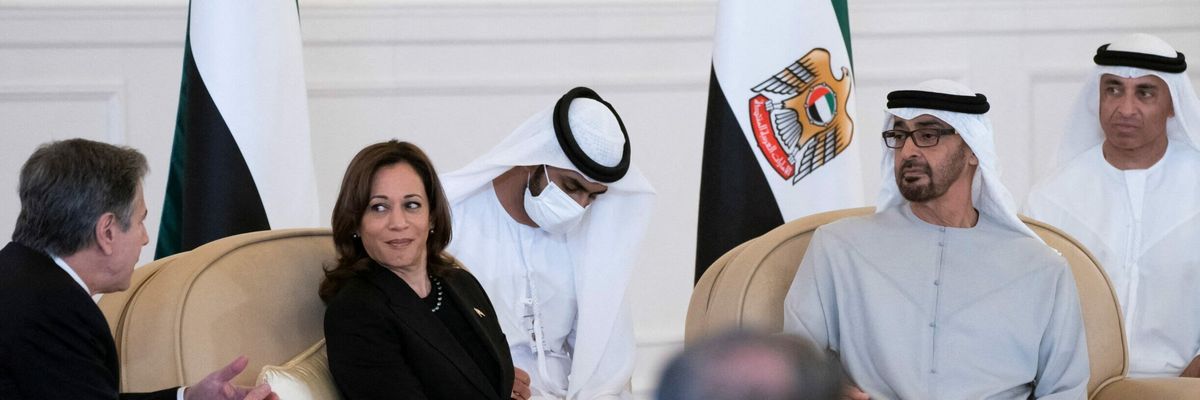The emir of Abu Dhabi and president of the United Arab Emirates, Sheikh Khalifa bin Zayed al-Nahyan, died on Friday, aged 73. The following day, his half brother, Crown Prince Mohammed bin Zayed, often referred to as MBZ, became the new emir of Abu Dhabi.
With a unanimous vote cast by the leaders of the other six emirates, MBZ also became president: since the UAE unified in 1971, the ruler of Abu Dhabi — the largest and wealthiest emirate — has always been elected president.
By Sunday, world leaders had begun to gather in the Emirati capital to pay their respects to Sheikh Khalifa, but more importantly, to affirm ties with MBZ, who has acted as the UAE’s de facto leader since Khalifa suffered a massive stroke in 2014.
On Monday, U.S. Vice President Kamala Harris led the highest-ranking American delegation to visit the UAE since President Biden took office. The group included Secretary of State Antony Blinken, Defense Secretary Lloyd Austin, Climate Envoy John Kerry, and CIA Director Bill Burns. The seniority of the delegation speaks to the Biden administration’s desire to improve ties to the Emirates that have been uncharacteristically rocky since the end of the Trump administration during which bilateral relations flourished.
Cracks in the U.S.-Emirati relationship became increasingly visible when Emirati officials made little secret of their frustration with the alleged inadequacy of the American response to a Houthi drone attack on Abu Dhabi in mid-January, The UAE’s decision to abstain from the UN Security Council resolution February 26 to condemn Russia’s invasion of Ukraine confirmed to many in Washington that relations were on a very negative trajectory.
The Biden administration has repeatedly affirmed the importance of the U.S.-Emirati relationship in a manner that echoes their support for the U.S.-Saudi relationship despite the clear preference both Gulf states have demonstrated for Biden’s predecessor. Trump selected Saudi Arabia as the first stop on his first overseas tour as president; during the visit, Saudi and Emirati officials successfully convinced Trump to greenlight their subsequent blockade of Qatar. Trump later defended the Saudi Crown Prince following his role in the horrific murder and dismemberment of U.S. resident and Washington Post contributor Jamal Khashoggi by a Saudi hit team in October 2018, and unequivocally supported the Saudi-led war on Yemen in which the UAE also played a major role.
For the UAE, the Trump administration orchestrated the Abraham Accords, through which the Emirates’ quiet relationship with Israel became officially normalized; Bahrain, Sudan, and Morocco later joined the Accords as well. As a result of the agreement, the UAE gained unprecedented access to American weapons, including the F-35 fighter, despite some Congressional opposition. Following Biden’s election, U.S. concerns about China’s growing ties to the UAE provoked the Emirates to threaten to withdraw from the $23 billion arms deal, although Secretary Blinken has since expressed the administration’s continued commitment to the deal’s success.
After initially voicing its devotion to promoting democracy and human rights in the Middle East, the Biden administration has instead decided to prioritize Washington’s commitment to the security of both the Saudis and Emiratis, notably by providing additional Patriot anti-missile systems to Riyadh in March and sending a naval Destroyer and fifth-generation fighter planes to help defend Abu Dhabi following the Houthi drone attack. This largely reflects concerns that if Washington does not solidify ties to the Saudis and Emiratis, they will turn to China and Russia for future weapons sales, undermining America’s dominance as the world’s largest arms dealer.
The seniority of the American officials dispatched to Abu Dhabi on Monday reflects the Biden administration’s view of the UAE as a critical partner and an opportunity to reset the relationship. Despite U.S. entreaties, both MBZ and de facto Saudi ruler MBS refused to increase fossil fuel production following Russia’s invasion of Ukraine. CIA chief Bill Burns was sent to Jeddah in April to try to improve relations with Saudi Arabia. Yet despite reports of a positive meeting, no concrete progress emerged.
As the talks to restore the Iran nuclear deal remain stalled, it seems the Biden administration has fallen back on old habits: prioritize relations with the UAE and Saudi Arabia, as well as with Israel. All three oppose U.S. diplomacy with Iran and have demanded a formal security guarantee from the U.S. to help assuage their concerns that the restoration of the 2015 agreement with Tehran won’t prejudice their strategic interests.
If Saudi Arabia were to follow the UAE and agree to normalize with the Israelis — a goal that even Trump could not achieve — Biden might be willing to formalize a security commitment to the Saudis, alongside the Emiratis, and perhaps the Israelis and Egyptians as well. Qatar, recently designated a major non-NATO ally, might also demand inclusion in a new and stronger U.S. security guarantee for the region.
While Biden initially pledged to fundamentally rethink America’s relationship to autocracies like Saudi Arabia and the UAE, the allure of billion-dollar weapons sales and cheaper oil and gas prices — especially in the wake of the Russian-Ukrainian war — have proven more durable than his commitment to campaign promises.
















